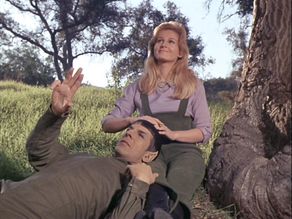Ari
March 2, 2016
Episode 24 – TOS 1×24: “This Side of Paradise”
In this week’s episode, the Enterprise crew is dispatched to investigate the fate of the worst summer camp of all time.
Technically they’re trying to establish the fate of the probably-lost colony of Omicron Ceti III – “lost” because after the colonists had already departed, Earth scientists discovered that the planet was under constant bombardment by deadly radiation that not only kills within a week but disintegrates unprotected organic tissue. (I mean, “lethal disintegrating radiation” would definitely be in the “must verify” Cons column in my Should We Colonize This Planet Pros/Cons checklist, but what do I know, I have an English degree.) The Enterprise arrives expecting to find no trace of the sadly-dead colonists, but then beam down to discover that… uh, they’re definitely all alive. Somehow.
Hey there, say the colonists. Sorry we haven’t called, but our space radio was busted, and we were busy founding a collectivist space farm commune on this perfect, perfect, perfect, perfect planet!
Fortunately this is one of those times where our heroes look at each other and say “hey, that’s weird,” and they keep asking reasonably pertinent questions, like a) what happened to all of your farm animals? and b) why are you all so eerily content? And actively attempting to solve the mystery.
Also present among the colonists is a woman from Spock’s past, botanist Dr. Leila Kalomi, who had a Thing for Spock that, by all evidence, he either did not, or could not, reciprocate. Leila is delighted to see Spock again, and equally delighted to answer all of his questions about how the hell they’re all still alive. The answer, amazingly, is flowers – flowers that, uh, well, there’s no other way to say it: ejaculate into people’s faces the moment they get close enough.

Leila exposes Spock deliberately, hoping to convince him to stay with them and, specifically, with her – and is upset when the affect of the isn’t as painless for half-Vulcan Spock as it was for the purely-Human colonists. He comes out the other side, though, as One of Them – because the flowers’ spores not only protect the colonists from radiation, but also create a kind of psychic groupthink that suffuses everyone with an overwhelming sense of perfect happiness and serenity, which doesn’t sound so bad until you substitute “serenity” with “total social stasis and possible mind control.”
Weirder still, under the influence of the flowers Spock is happy, for the first time in his life, which Nimoy portrays in a way that is somehow both gratifying (because even by whatever definition you want to use for a half-Vulcan, Spock is not, generally, a very “happy” man) and deeply, deeply unsettling (because flower-high Spock is disarmingly, heart-breakingly happy). Especially once he joins the colonists in their mission to convert the entire Enterprise crew.
Kirk saves the day by virtue of his immunity to happiness, but we’re left with some pretty troubling questions, like is happiness, imposed from without, really happiness? And is it better to be content but never change, or to change and grow at the expense of perfect serenity? And is paradise, by those descriptors, something anyone really wants?
Podcast: Play in new window | Download | Embed
Subscribe: Apple Podcasts | Email | RSS
Related Posts
-
Episode 85 – “Star Trek 6: The Undiscovered Country”
June 23, 2017
-
Episode 84 – “Star Trek 5: The Final Frontier”
June 14, 2017
